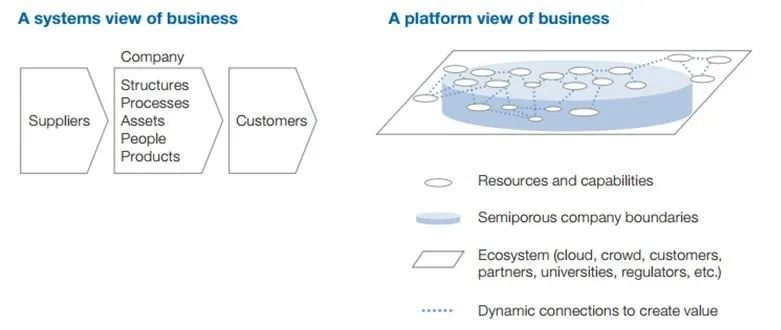Doing more than you ever did, getting more than you’ve ever got
Platforms beat products every time
In my previous blog on platform economy, I referenced Marshall Alstyne of MIT and his presentation “Platform Strategy & Open Business Models”, because In today’s digital business world, platforms beat products every time.

A platform, on the other hand, needs a different approach. Platform thinking moves the focus from goods and services to the overall interaction that they create; it also looks at how this new focus can make the market more efficient over time. Since the whole model revolves around users (as producers) producing value for other users, there’s a risk in being one of the early adopters. Some equate the scenario to the chicken and the egg. For example, consider the GPS satellite navigation apps. These apps now come with social features and crowdsourced data where users upload useful real-time information on traffic, accidents and other road blockages. More users on this platform translates to more valuable information, making the service more attractive to new drivers.
As Platform Revolution explains: “Platform businesses are eating the world”. While traditional businesses look at ways in which they can market their assets or services, disruptors such as Fiverr are looking at ways in which they can market assets and services that they may (but not always) own but didn’t create. With a platform they make new engagements and interactions easier – and at the same time, they can improve the way in which people both demand and – here’s the extraordinary thing – actually provide services to each other.

The platform business recipe
Access
It seems obvious, but a platform business model is a business platform. This means that external users must be able to access it, and it needs to provide a useful function or service.
Communities
A community doesn’t just consist of the people who use it – it also comprises those who contribute in other ways. Reddit, for example, includes the system developers but also many others in the community: those who have a profile, create links, articles or downloadable files, advertisers, and contacts.
Culture
A culture is there at the very start and is what holds a community together, but it will change and refine itself as the platform and community mature.
Data
Almost 90 percent of the data that exists today is new-cast. It’s continually growing, especially with today’s multichannel/omnichannel models capturing, storing and analysing terabytes of information every second.
Intelligence
Intelligent decision support systems will rule future business. A typical example is the way in which travel booking websites make recommendations, based on the previous interactions that you’ve had with the platforms.
Connectivity
The growth of mobile, the use of tablets, smartphones, BYOD, laptops and countless other devices has created new relationships and interactions in a technological sense. However, the human element is also paramount. New markets, ecosystems and people are connecting to each other in entirely new ways.
Democratisation of production
Now that there’s a readily accessible market, companies are finding new sources of production at an unparalleled rate. The rise of new producers is the hallmark of the platform age.
Leadership
CIOs now have a new role as an “innovation champion”. The CIO’s ability to foresee possibilities, create a compelling case for adopting a model that will allow opportunities to be seized, and build a platform that will act as a gateway into the promised land – all will depend on their leadership and visionary skills.
Most CIOs I meet have innovation high on their radar. Many have some of these elements already. Those who take a holistic approach with a clear view of the business opportunity they are going for and navigate through the platform recipe will have a competitive advantage over the system/pipe based business.
(Disclaimer: The views and opinions expressed in this article are those of the author and do not necessarily reflect the views of YourStory.)







